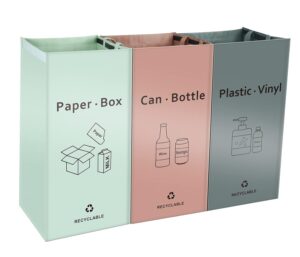When you think about “waste management,” the finance sector probably isn’t the first thing that comes to mind. We often picture factories, supermarkets, or households; not banks, insurance companies, or fintech offices.
But here’s the truth: the financial sector generates more waste than it realizes. From endless paper trails to obsolete computers and single-use plastics, finance institutions have a big opportunity and responsibility to lead Kenya toward a zero waste future.
Let’s explore how financial institutions can minimize waste, align with NEMA’s environmental regulations, and contribute meaningfully to the Sustainable Waste Management Act (2022) vision of a cleaner, circular Kenya. Find more posts on sustainability and waste management here.
Table of Contents
How Financial Institutions Can Minimize Waste.
What Does “Zero Waste” Really Mean?
Zero waste doesn’t mean producing absolutely no waste, that’s nearly impossible. It’s about rethinking how we use resources so that waste is minimized, reused, recycled, repaired or recovered, instead of being dumped or burned.
In Kenya, the Sustainable Waste Management Act, 2022 defines zero waste as a system where waste is managed to ensure:
✅ Minimal generation of waste at the source,
✅ Maximum recovery of reusable materials,
✅ And disposal only as a last resort.
For financial institutions, this means looking beyond compliance, it’s about building a sustainability culture that cuts waste, saves resources, and protects the planet.
Why Waste Reduction Matters in the Finance Sector
The finance sector might not deal with toxic industrial waste, but it plays a critical environmental role in three ways:
- Operational impact: Every office generates paper, e-waste, and general waste daily.
- Reputational impact: As key influencers of sustainable finance, banks and insurers are expected to lead by example.
- Investment impact: How financial institutions lend or invest determines the kind of projects that shape Kenya’s environment.
Minimizing waste isn’t just about cleaning offices, it’s about sustainability leadership. Clients, investors, and regulators now expect financial institutions to walk the talk on environmental responsibility.
Understanding Kenya’s NEMA Regulations on Waste
Before diving into how to minimize waste, let’s look at what the law says.
Under the Environmental Management and Coordination (Waste Management) Regulations, 2006, and the Sustainable Waste Management Act, 2022, every business in Kenya, including financial institutions, must:
- Segregate waste at source — Separate recyclables, organic waste, and hazardous waste right where they’re generated.
- Store waste safely — Use covered, labeled containers in secure areas.
- Use NEMA licensed handlers — Only authorized collectors can transport and dispose of waste.
- Promote waste reduction and recovery — Support recycling and reuse programs.
- Keep records — Maintain waste manifests or collection receipts for accountability.
The 2022 Act adds an even broader vision: shifting Kenya toward a circular economy, where materials remain in use as long as possible.
Now that we understand the regulatory base, let’s explore how the financial sector can apply it in practice.
How Financial Sectors Can Champion for Zero Waste and Circular Economy
1. Go (Truly) Paperless
If there’s one area where the finance sector can make an instant impact, it’s reducing paper waste.
Kenyan banks, SACCOs, and insurance offices still print thousands of pages every day; statements, forms, reports, receipts, memos, and loan documents. But digital transformation offers a cleaner, cheaper, and faster alternative.
Here’s how to make it happen:
✅ Adopt e-statements and digital signatures – Encourage clients to switch to online statements, receipts, and digital contracts.
✅ Use cloud storage – Replace bulky file cabinets with digital archives that save time and space.
✅ Automate HR and finance records – Digitize payslips, leave forms, and invoices.
✅ Encourage double-sided printing – When printing is necessary, use both sides and recycled paper.
Going paperless isn’t just eco-friendly, it cuts operational costs, improves data management, and strengthens your ESG performance.
2. Manage E-Waste Responsibly
E-waste is one of the fastest growing waste streams in the world and the finance sector is a major contributor. Think of old computers, printers, calculators, routers, ATMs, and server hardware.
In Kenya, e-waste disposal is regulated by NEMA, and improper disposal can lead to penalties under EMCA and the 2022 Waste Act.
Here’s what financial institutions should do:
- Keep an e-waste inventory: Track all electronic devices in use and those due for replacement.
- Store safely: Keep outdated devices in a dry, locked area away from moisture.
- Partner with licensed recyclers: Only hand over e-waste to NEMA approved handlers like WEEE Centre, Enviroserve Kenya.
- Refurbish or donate: Devices that still work can be repaired and donated to schools or NGOs which Enviroserve Kenya does.
Each refurbished laptop or recycled printer reduces toxic waste and supports Kenya’s circular economy vision.
3. Separate Waste at Source
According to the Waste Management Regulations (2006), segregation is mandatory at the point of generation or rather at the source.
In simple terms, don’t mix food waste with paper or e-waste.
Set up clearly labeled bins in office kitchens, lobbies, and workspaces for: [ side note: NEMA
- 🟩 Organic Waste (food remains)
- 🟦 Recyclables (paper, plastic bottles)
- 🟥 Non-recyclables (wrappers, broken items)
- 🟨 E-waste (batteries, electronics)
Train cleaning staff and employees to use them correctly. This small habit drastically reduces contamination and increases recyclability.
4. Eliminate Single-Use Plastics
Plastic bottles, straws, disposable cups, and cutlery, these are the silent culprits in every office pantry.
Under the Plastic Carrier Bags Ban (2017) and Sustainable Waste Management Act (2022), Kenya encourages institutions to reduce single-use plastics.
Here’s how the finance sector can comply and inspire change:
- Provide refillable water dispensers instead of bottled water.
- Encourage staff to use personal mugs and lunch containers.
- Replace plastic stirrers and straws with bamboo or metal alternatives.
- Source from suppliers that use minimal or recyclable packaging.
These small shifts build a sustainability culture and reduce plastic waste significantly over time.

5. Reuse, Repurpose, Recycle
The finance sector can also adopt creative reuse practices to extend product lifespans and reduce costs.
Here’s how:
- Repurpose old banners into reusable office bags.
- Reupholster or donate old office furniture instead of discarding it.
- Recycle printer cartridges through licensed collectors.
- Reuse envelopes or packaging materials for internal communication.
Kenya’s Sustainable Waste Management Act, 2022 encourages all institutions to participate in the circular economy, keeping products, materials, and resources in use for as long as possible.
This isn’t just environmental; it’s economical. Reusing and recycling can save thousands annually in procurement costs.
6. Create a Green Office Culture
Real waste reduction happens when everyone; from the CEO to the intern understands and believes in sustainability.
Here’s how financial institutions can embed this mindset:
🌱 Hold quarterly green days: Encourage teams to declutter offices, collect recyclables, or plant trees.
🗣 Educate staff: Run short NEMA compliant awareness sessions on proper waste handling.
💡 Reward eco-innovation: Recognize teams that come up with waste reducing ideas.
🤝 Partner locally: Collaborate with recycling startups, waste collectors, and schools for joint clean-up or awareness projects.
The goal? Make sustainability personal and rewarding, not just policy-driven.
7. Develop a Waste Management Policy
Every financial institution should have a written waste management policy aligned with NEMA’s Waste Management Regulations and the Sustainable Waste Management Act (2022).
This policy should outline:
- How waste is segregated and stored.
- Roles and responsibilities (including staff and cleaners).
- Approved disposal and recycling partners.
- Reporting and record keeping systems.
Having a clear policy not only ensures compliance but also shows regulators, investors, and the public that your organization takes environmental stewardship seriously.
8. Support the Circular Economy Through Financing
The financial sector has a unique opportunity, it can fund the circular economy.
Banks and investors can extend credit, grants, or green loans to:
- Recycling companies
- Upcycling startups
- Waste to energy initiatives
- Plastic recovery ventures
This aligns with the Sustainable Waste Management Act (2022), which encourages financing mechanisms that promote sustainable waste management. By doing this, financial institutions don’t just minimize their own waste, they help scale nationwide solutions for others.
9. Monitor, Measure, and Report
What gets measured gets managed.
Create a simple waste tracking system that records:
- How much waste your institution generates monthly.
- How much is recycled, reused, or sent to licensed handlers.
- Reductions achieved over time.
Use these records for sustainability or ESG reports, demonstrating your progress toward Kenya’s zero waste goals. This transparency also strengthens trust among regulators, clients, and investors.

The Road to Zero Waste in Finance
Moving toward zero waste is a journey, not a one-off project. But the financial sector is perfectly positioned to lead.
When banks and fintechs go paperless, manage e-waste properly, and finance circular innovations, they set the tone for Kenya’s sustainability future.
Zero waste isn’t just about managing trash, it’s about rethinking our systems, decisions, and values.
Final Thought
As Kenya advances its Sustainable Waste Management Act (2022) and NEMA enforces environmental compliance, every financial institution has a role to play.
Minimizing waste is good for the environment, great for compliance, and even better for business. It builds efficiency, trust, and a powerful reputation as a leader in sustainable finance.
So, whether you’re a SACCO in Kisumu, a bank in Nairobi, or a fintech in Mombasa, the next time you recycle, digitize, or reuse something in your office, remember: You’re helping build Kenya’s zero waste future.



